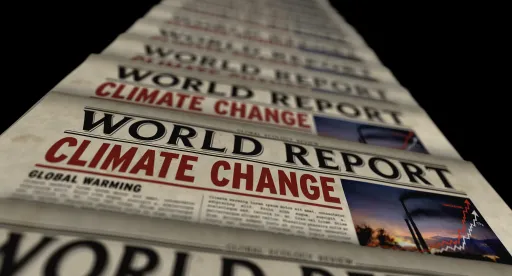On March 6, 2024, the U.S. Securities and Exchange Commission (SEC) adopted by a vote of 3-2 final amendments to its rules instructing large publicly traded companies to provide standardized climate-related information in SEC registration statements and annual reports. The rules will require data about the affected companies’ climate risks that materially impact their business strategy, results of operations, or financial condition.
The rules generally require large publicly traded companies to disclose emissions resulting directly from sources controlled or owned by the company (referred to as “Scope 1” emissions) and emissions resulting from electricity, steam, heat, or cooling purchased to support company operations (referred to as “Scope 2” emissions).
However, an affected company is only required to disclose its Scope 1 or Scope 2 emissions if the company deems such information “material,” a term of art under long-standing SEC rules.
The final rule does not require disclosure of emissions resulting from assets not owned or controlled by a reporting company but that are a part of its supply chain (referred to as “Scope 3” emissions).
The SEC’s three Democrat-appointed members voted in favor of the final rule. The two Republican-appointed members voted against.
Materiality Test
The SEC scaled back the reach of the final rules relative to the Commission’s original March 2022 proposal.
Under the proposal, affected companies were required to calculate and disclose their Scope 1 and Scope 2 emissions. Under the final rule, an affected company need only report Scope 1 or Scope 2 data that it deems “material.” SEC rules generally provide that a publicly traded company’s information is “material” if there is a substantial likelihood that a reasonable investor would consider the information important in determining how to vote or make an investment decision related to the company.”[1]
Based on the SEC’s analysis, only forty percent of publicly traded companies will be required to perform the materiality test in determining what emissions to report, which equates to approximately 7,000 companies. Smaller publicly traded companies—generally, companies with less than $1.2 billion in annual revenues—are exempt from the new rules.
The final rule does not articulate a precise test for what emissions or other data are material. However, the rulemaking does give examples of when a company’s Scope 1 or Scope 2 emissions may be material, including (1) if the company predicts that future regulations will increase business costs, and (2) if the company has a stated climate goal. One such goal can be if the company aims to achieve net-zero emissions by a certain date.
The SEC has other disclosure requirements subject to a materiality standard; as with those disclosures, companies themselves will analyze whether their emissions are material in the first instance. Companies are not required to publish to investors how they perform such materiality analyses. However, if a company omits information later determined to be material, the company may be subject to SEC enforcement or investor litigation.
Specific Requirements
The final rules will require an affected company to disclose climate-related risks that could have a material impact on the company’s business strategy, results of operations, or financial conditions. If an affected company has undertaken activities to mitigate or adapt to a climate risk, it is required to provide a quantitative and qualitative description of material expenditures and impacts on financial estimates and assumptions that directly result from the mitigation or adaptation activities.
Additionally, affected companies are required to provide any oversight by the board of directors of climate-related risks and any role by company management in assessing and managing its material climate risks. Climate-related targets and goals are to be provided, if they have materially affected or are reasonably likely to materially affect the company’s business, results of operations, or financial condition.
An affected company is also required to disclose capitalized or expensed costs, charges and losses incurred due to severe weather events and other natural conditions, including hurricanes, tornadoes, flooding, drought, wildfires, extreme temperatures, and sea level rise, subject to one percent and de minimis disclosure thresholds, as well as such costs and losses related to carbon offsets and renewable energy credits or certificates (RECs) if used as a material component of the company’s plans to achieve disclosed climate goals, such as net-zero commitments.
Impacts
A principal goal of the new rules is to standardize climate disclosures. Currently, many large companies publicly report emissions information and climate risks, but companies use different reporting methodologies, forms, and venues. The final rules create a formal reporting system for such emissions data and climate risk information.
Large companies without direct emissions, including banks and technology companies, may not have a need to disclose Scope 1 emissions. In those cases, Scope 2 emissions may need to be considered more closely. This will be especially important for fast-growing companies consuming large amounts of electricity, such as publicly traded technology companies that own data centers.
The removal of a requirement to calculate and disclose Scope 3 emissions, such as emissions from upstream supply chains, is a major change from the proposal, and controversial. Critics of inclusion of Scope 3 reporting pointed out that the supply chains of large companies consist of numerous small entities (including farms). A Scope 3 requirement effectively would burden these small entities with onerous data collection requirements. The critics also asserted that methodologies for Scope 3 calculations are still highly uncertain and inaccurate. Proponents of Scope 3 reporting disputed each of these points. They also asserted that Scope 3 emissions form the bulk of the carbon footprint for many publicly traded companies, particularly companies in the industrial sector; therefore, omitting Scope 3 data would deprive investors of material information.
The State of California has taken a different approach than the SEC. The state’s legislature has passed two laws, SB 253 and SB 261, that would impose disclosure requirements. SB 253, the “Climate Corporate Data Accountability Act”, requires both public and private companies that have annual revenue above $1 billion and do business in California to disclose their total annual greenhouse gas emissions. The reporting mandate would cover Scope 1 and Scope 2 emissions beginning in 2026, and Scope 3 emissions beginning in 2027. SB 253 is subject to in-state legal challenges and its future interaction with the final SEC rule is unclear.
Next Steps
The final SEC rule will become effective 60 days following its publication in the Federal Register. Compliance deadlines are phased in for affected companies depending on their filing status.
The new rule is already facing legal challenges. Immediate litigation was filed by Republican leaders in ten states. West Virginia and Georgia filed a petition for review in the 11th Circuit with backing from eight other states, arguing the rule effectively imposes environmental regulations on the energy industry without clear statutory authority and raises First Amendment concerns. Business groups including the National Association of Manufacturers (NAM) have threatened lawsuits if they deem the Commission exceeded its legal authority. Additionally, Republican congressional leaders have prepared an effort to rescind the rule through the Congressional Review Act, which allows Congress to overturn an agency regulation along with a sympathetic White House choosing not to veto such a resolution. Environmental groups advocating for more robust reporting requirements may initiate their own litigation.
Footnotes
[1] See 17 CFR 230.405 (definition of “material”); 17 CFR 240.12b-2 (definition of “material”). See also Basic Inc. v. Levinson, 485 U.S. 224, 231, 232, and 240 (1988).





 />i
/>i


